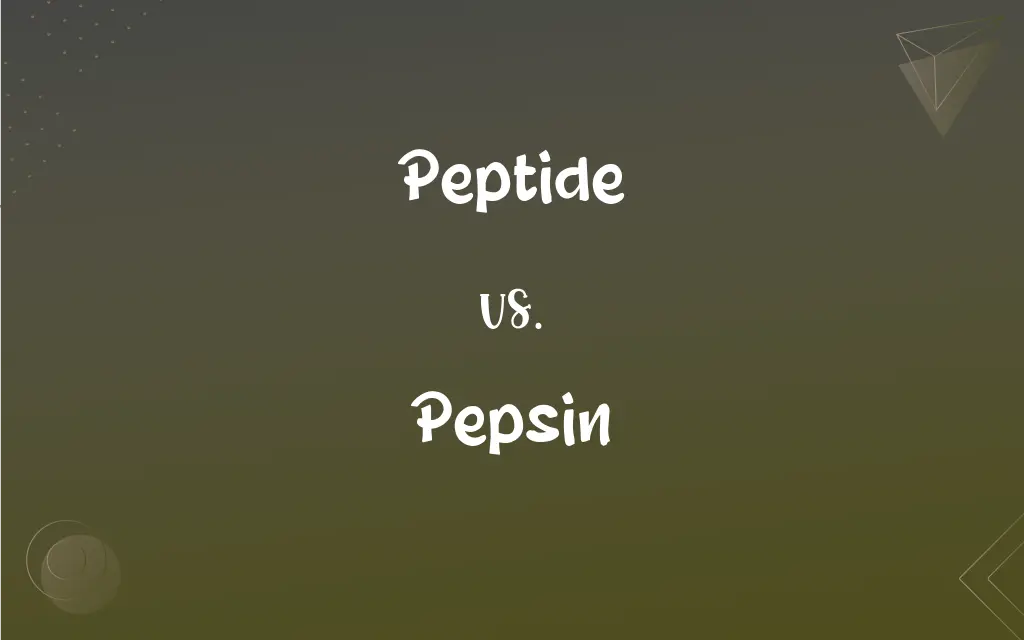Peptide vs. Pepsin: What's the Difference?
By Aimie Carlson || Updated on May 30, 2024
Peptide refers to short chains of amino acids linked by peptide bonds, while pepsin is a digestive enzyme that breaks down proteins into peptides.

Key Differences
Peptide refers to molecules consisting of two or more amino acids linked by peptide bonds. These short chains are the building blocks of proteins and play numerous roles in biological processes. Peptides are essential in cell signaling, immune response, and as hormones. Pepsin, on the other hand, is an enzyme crucial for digestion. It is produced in the stomach and breaks down proteins into smaller peptides. This enzyme is activated in the acidic environment of the stomach and is vital for the initial stages of protein digestion.
Peptides can vary in length, ranging from two to several dozen amino acids, and they can form complex structures. In contrast, pepsin is a single enzyme with a specific function in the digestive system. It cleaves the peptide bonds in proteins to produce smaller peptides that can be further digested.
While peptides are involved in numerous physiological processes beyond digestion, pepsin's role is more specialized. Pepsin functions specifically in the digestive tract, whereas peptides can be found throughout the body performing various roles.
Peptides can act as signaling molecules, influencing various biological pathways, whereas pepsin's role is mechanical, breaking down dietary proteins into absorbable units.
Comparison Chart
Definition
Short chains of amino acids
Digestive enzyme
ADVERTISEMENT
Function
Cell signaling, immune response, hormones
Protein digestion
Location
Throughout the body
Stomach
Composition
Varies in length and structure
Single enzyme
Role
Diverse biological processes
Specific to digestion
Peptide and Pepsin Definitions
Peptide
Short chain of amino acids linked by peptide bonds.
The research focused on a peptide involved in immune response.
ADVERTISEMENT
Pepsin
Component of the digestive system.
Pepsin is essential for the digestion of dietary proteins.
Peptide
Building blocks of proteins.
Insulin is a peptide hormone crucial for regulating blood sugar.
Pepsin
Digestive enzyme in the stomach.
Pepsin breaks down proteins into smaller peptides.
Peptide
Molecules playing roles in signaling and regulatory functions.
The peptide influenced the cellular communication pathway.
Pepsin
Enzyme activated by stomach acid.
Pepsinogen converts to pepsin in the acidic environment of the stomach.
Peptide
Biological molecules formed by the translation of mRNA.
The synthesis of the peptide was observed in the ribosome.
Pepsin
Protein-degrading enzyme.
The action of pepsin is necessary for protein absorption.
Peptide
Substances used in therapeutic treatments.
The new drug is a peptide designed to treat metabolic disorders.
Pepsin
Enzyme functioning optimally at low pH.
Pepsin is most active in the acidic conditions of the stomach.
Peptide
Any of various natural or synthetic compounds containing two or more amino acids joined by peptide bonds that link the carboxyl group of one amino acid to the amino group of another.
Pepsin
A digestive enzyme found in gastric juice that catalyzes the breakdown of protein to peptides.
Peptide
(organic compound) Any of a class of organic compounds consisting of various numbers of amino acids in which the amine of one is reacted with the carboxylic acid of the next to form an amide bond.
Pepsin
A substance containing pepsin, obtained from the stomachs of hogs and calves and used as a digestive aid.
Peptide
(chemistry) The peptide bond itself.
Pepsin
(enzyme) A digestive enzyme that chemically digests, or breaks down, proteins into shorter chains of amino acids.
Peptide
Amide combining the amino group of one amino acid with the carboxyl group of another; usually obtained by partial hydrolysis of protein
Pepsin
A proteolytic enzyme (MW 34,500) contained in the secretory glands of the stomach. In the gastric juice it is united with dilute hydrochloric acid (0.2 per cent, approximately) and the two together constitute the active portion of the digestive fluid. It degrades proteins to proteoses and peptides, and is notable for having a very low pH optimum for its activity. It is the active agent in the gastric juice of all animals.
Pepsin
An enzyme produced in the stomach that splits proteins into peptones
FAQs
What does pepsin do?
Pepsin is an enzyme that breaks down proteins into smaller peptides in the stomach.
Where is pepsin produced?
Pepsin is produced in the stomach.
Where are peptides found?
Peptides are found throughout the body and are involved in various physiological processes.
How many amino acids are in a peptide?
Peptides can consist of two to several dozen amino acids.
What is the precursor to pepsin?
Pepsinogen is the inactive precursor that converts to pepsin.
What activates pepsin?
Pepsin is activated by the acidic environment of the stomach.
What is the structure of pepsin?
Pepsin is a single enzyme with a specific function.
What is a peptide?
A peptide is a short chain of amino acids linked by peptide bonds, acting as the building blocks of proteins.
Are peptides and pepsin related?
Yes, pepsin breaks down proteins into peptides during digestion.
What roles do peptides play?
Peptides play roles in cell signaling, immune response, and as hormones.
Is pepsin essential for digestion?
Yes, pepsin is crucial for breaking down dietary proteins.
Can peptides form proteins?
Yes, peptides are the building blocks that combine to form proteins.
Is pepsin a peptide?
No, pepsin is an enzyme, not a peptide.
Is pepsin found outside the stomach?
No, pepsin primarily functions in the stomach.
Are all peptides involved in digestion?
No, peptides have various roles beyond digestion.
How does pepsin function?
Pepsin cleaves peptide bonds in proteins to produce smaller peptides.
Do peptides have therapeutic uses?
Yes, some peptides are used in medical treatments.
Does pepsin work in non-acidic environments?
No, pepsin requires an acidic environment to function.
What happens to peptides after digestion?
Peptides are further broken down into amino acids for absorption.
Can peptides act as hormones?
Yes, some peptides function as hormones.
About Author
Written by
Aimie CarlsonAimie Carlson, holding a master's degree in English literature, is a fervent English language enthusiast. She lends her writing talents to Difference Wiki, a prominent website that specializes in comparisons, offering readers insightful analyses that both captivate and inform.































































